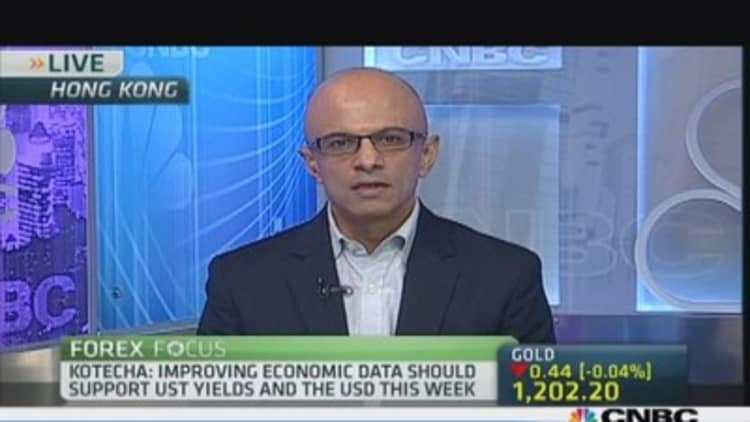
Expectations that the Federal Reserve would taper its asset-purchase program sent many currencies on a rollercoaster ride this year, and according to analysts, the pain isn't over yet.
Mitul Kotecha, head of global markets research Asia at Credit Agricole bank, says higher U.S. yields, relative growth outperformance and higher capital flows back into the world's largest economy will all help boost the greenback in 2014.
"We believe the currency [dollar] will strengthen broadly against a lot of major currencies and a lot of emerging market currencies. The key is which currencies will suffer the most in 2014 on the back of a stronger U.S. dollar," he told CNBC Asia's Cash Flow on Monday.
(Read more: Ding ding: Taper tantrum round two?)
Kotecha singled out the Japanese yen, which has lost nearly 20 percent against the dollar this year and the , which has strengthened 3.7 percent against the dollar over the same period, as the major currencies likely to fare worst amid dollar strength.
"It will be a difficult year for the yen. Dollar-yen will get to 115 by the end of 2014," he said. "We also think the underlying support for the euro will begin to fade next year, potentially getting down to 1.28 (euro-dollar) by the end of 2014," he added.
Yen weakness has been a key theme of 2013 as policy makers have embarked on an easing-heavy reform plan designed to overhaul the economy.
The euro, meanwhile, has risen in recent months on the back of expectations of a pickup in growth after the region emerged from recession earlier in the year.
The euro-dollar traded at 1.3694 in early trade in Asia on Tuesday, while the dollar-yen traded at 104.20.
(Read more: More pain for the Australian dollar)
Other currency analysts also suggested the euro is set for pain next year.
According to Westpac bank analysts, euro zone growth momentum is set to slip against the U.S.'s in the first quarter, which will increase the likelihood of the European central bank being forced to loosen monetary policy at the same time as Fed tapers its quantitative easing program.
"This should see the euro-dollar fall substantially," said Sean Callow, senior currency strategist at Westpac Global Markets Strategy Group.
Meanwhile Chris Weston, chief market strategist at IG Markets also said he saw the euro-dollar weakening to 1.28 by the end of 2014.
"The biggest thing for me is the political issues. In May, there will be the European parliament elections coming through... I think political uprisings in favor of more anti-E.U. parties are gaining more traction, especially with unemployment at 12 percent. They [the euro zone] need a weaker currency for competitive reasons and that's why I'm more negative on the euro than the U.S. dollar," he added.
Meanwhile, the currencies set for the worst declines against the dollar would be the same ones that suffered sharp selloffs earlier in the year, according to Credit Agricole's Kotecha, when tapering panic spurred a mass exodus from riskier assets.
(Read more: Goldman Sachs: Cut your emerging markets exposure)
"I think the currencies we will see suffer, because of capital outflows and external vulnerabilities, are the Indian rupee, the Indonesian rupiah, the Turkish lira, the and the . These are all in the categories that we will see the worst performance next year," he said.
Westpac also said it forecast North East Asian currencies, like the Taiwan dollar and the Chinese yuan, to outperform South East Asian currencies.
"North East Asia economies have strong current account positions and large FX reserves, which should present a strong firewall against the tapering theme and potential capital outflows," said Jonathan Cavenagh, Westpac's senior currency strategist analyst.
But IG Markets' Weston said he did not see emerging market currency pain being as extreme next year.
"There still will be weakness coming through for countries running sizable deficits that haven't addressed them enough. But I think the liquidation issue has been abated and I don't expect to see the same kind of volatility as we saw earlier this year," he added.
(Read more: How some emerging markets get taper insulation)
— By CNBC's Katie Holliday: Follow her on Twitter @hollidaykatie


